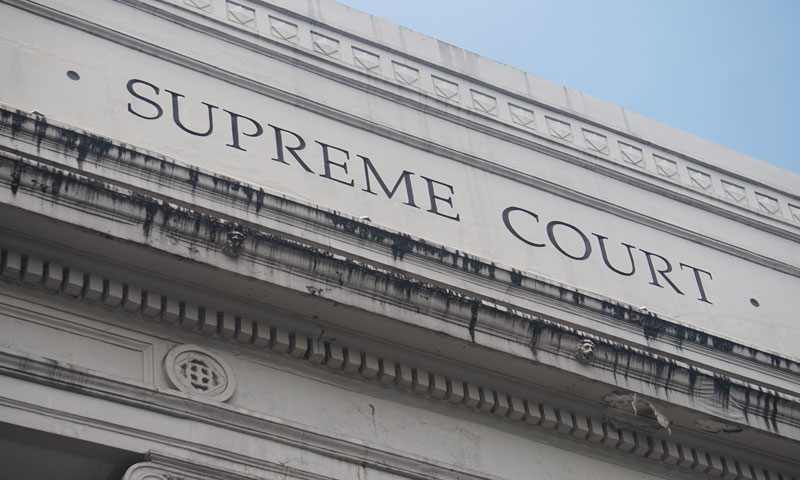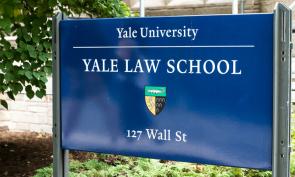
SCOTUS Composition, by Justices’ Law Schools
For the current roster of high court justices, Harvard Law School is represented by the following alumni: Chief Justice Johns Roberts; Anthony Kennedy; Stephen Breyer; Elena Kagan; and Ruth Bader Ginsburg (who graduated from Columbia Law School after attending Harvard Law).
The Yale Law School graduates are Clarence Thomas; Samuel Alito; and Sonia Sotomayor.
Recently deceased Antonin Scalia also graduated from Harvard Law School, as did Neil Gorsuch, the man who is expected to assume Justice Scalia’s seat on the high court.
SCOTUS Composition, by Law Clerks’ Law Schools
As depicted on the chart below, the Harvard-Yale trend we see with Supreme Court justices also applies with SCOTUS law clerks. Dating back since 1960, graduates of Harvard Law School lead the list of youngsters privileged enough to clerk for a Supreme Court justice, followed by graduates of Yale Law School. During that period, Harvard sent 491 law clerks to the high court and Yale sent 378. Since 1960, Harvard has always led Yale (as well as every other law school) in sending clerks to the Supreme Court, except for the period from 2010 to the present, when Yale sent 91 clerks and Harvard sent 90.
After Harvard and Yale, the only other law schools that have sent more than 100 law clerks to the Supreme Court since 1960 are the University of Chicago Law School (148 clerks); Stanford University Law School (139 clerks); Columbia Law School (114 clerks); and the University of Virginia School of Law (112 clerks).
Eleven law schools turned out just two SCOTUS clerks since 1960 and another 31 schools turned out just one. Many other law schools have never seen even one of their graduates obtain a clerkship for a United States Supreme Court justice.
Importance of Supreme Court Law Clerks
Being a Supreme Court law clerk is an extremely prestigious and intellectually demanding position, and it can open many professional doors for the remainder of an attorney’s career. SCOTUS law clerk positions are highly, highly selective, and contenders must generally have earned top grades at top law schools and done extensive legal research and writing in a law review context. Moreover, most judicial clerks come to SCOTUS having already completed at least one significant clerkship for a judge on one of the country’s Circuit Courts of Appeal.
Law clerks perform essential roles for the justices for whom they work and are integral parts of the Supreme Court ecosystem. Though each justice has his or her own way of utilizing and mentoring his or her clerks, the basic job of a Supreme Court law clerk is to assist the justices get through their workload. This means helping organize and prioritize the voluminous legal challenges that get filed in the Supreme Court each year, researching and writing about cutting-edge and controversial legal issues, helping draft opinions, serving as sounding boards for the justices, and—at the highest level—helping justices develop and hone their legal philosophies and legacies.
Each Associate Justice is allowed four judicial law clerks, while the Chief Justice gets five.
Many former clerks go on to important positions in private legal practice and in various government positions. In some cases, former Supreme Court clerks have become Supreme Court Justices themselves, as was the case with Byron White; John Paul Stevens; William Rehnquist; Stephen Breyer; John Robert; and Elena Kagan. If confirmed, Neil Gorsuch will join this group, as Gorsuch clerked for Justice Anthony Kennedy.
Implications for Elite Law School Domination of the Supreme Court
While few would question the intellectual ability of a top student from a top law school like Harvard or Yale to handle the analytical rigors of a Supreme Court clerkship, some question whether a high court dominated by a few elite schools and their graduates is wise for the country and for the evolution of the law. The idea is that the Supreme Court—which influences every aspect of our lives as citizens in fundamental ways—might benefit from having a wider variety of backgrounds, voices, and perspectives.
Critics of the elite composition of the Court believe that the “law of the land” should reflect the experiences, education, and ways of understanding and interpreting the Constitution of many different types of qualified jurists, including those who were educated within the “intellectual bubbles” of Harvard or Yale, but also including many other brilliant and insightful people who were educated at places besides Harvard and Yale. Advocates of a less homogenous Court believe that diversity will enhance the evolution of the law and ensure that seminal decisions that change lives and move society in different directions are as fair and representative as possible.
Frequently Asked Questions
What Law Schools Do Supreme Court Clerks Come From?
Among the most prestigious clerkships are those with the United States Supreme Court, the United States courts of appeals, United States district courts, specialized courts such as the United States Tax Court and the United States Bankruptcy Court, the New York State Commercial Division, Delaware Court of Chancery, and state supreme courts. Some U.S. district courts provide particularly useful experience for law clerks pursuing specific fields.
Below is a list of law schools from which the U.S. Supreme Court Clerks have graduated:
1. University of Chicago (Chicago Law School): 27.59%
2. Yale Law School: 25.49%
3. Stanford Law School: 23.08%
4. University of Virginia: 17.46%
5. Vanderbilt University: 16.67%
6. Harvard Law School: 14.74%
7. Washington University: 13.92%
8. University of Georgia: 12.64%
9. The University of Texas at Austin: 12.11%
10. University of Alabama: 11.81%
11. Duke University: 11.68%
12. University of California-Berkeley: 10.57%
13. University of Mississippi: 9.82%
14. William and Mary: 9.34%
15. University of Pennsylvania: 9.30%
16. University of Michigan: 9.04%
17. University of Notre Dame Law School: 9.00%
18. University of Arkansas-Fayetteville: 8.04%
18. University of North Carolina: 8.04%
20. University of Iowa: 7.52%
How Many Law Clerks Do Supreme Court Justices Have?
The number of law clerks a US Supreme Court Justice may have during a court term varies between three and four. Law clerks are often recent law school graduates who excelled in their classes. Additionally, clerks do legal research to help justices decide which cases to accept and what questions to ask during oral arguments, develop memoranda, and draft orders and opinions. According to research, clerks exert a moderate influence on how justices vote in cases, but they exert a greater influence in cases that are high profile, legally significant, or close.
Can A Law Student Be A Law Clerk?
The answer is YES..!!!
Pre-law students may obtain a judicial clerkship by working in the chamber of a judge. A clerkship can be for state courts, federal courts, bankruptcy courts, or supreme court clerkship. Clerkships, which are usually one to two years long, give pre-law students the opportunity to serve as a judge's personal attorney. Due to the fact that many judges rely heavily on the advice of their clerks, judicial clerks have a lot of responsibility and an opportunity to gain extensive knowledge of the judicial system.
A clerkship is a learning experience for students who are studying and training to become attorneys. In this way, they get a first-hand look at the legal system through the eyes of a judge rather than an attorney. A lawyer can become a prosecutor or a defense attorney, which are two very different positions. Observing both sides of the law is one of the benefits of working alongside a judge as a clerk. Moreover, this gives them valuable learning opportunities as they embark on their legal careers. A judicial clerk is often able to provide the judge with answers to his or her questions, making them a valuable asset.
What Does a Clerk for the United States Supreme Court Do?
The Court keeps its internal operating procedures confidential, but we know that law clerks have a significant impact on the caseload of a Term.
They share much of a Justice's work and influence his or her thinking. Through wading through the cert. To provide recommendations about which cases the Court should consider, a clerk works with his or her Justice.
The Justice must ultimately decide whether certification should be granted.
Clerks are also responsible for researching case law, preparing the Justice for oral argument, and drafting major portions of majority and dissenting opinions, often without significant revisions from the Justices themselves.
Typically, the Justice who is assigned to write an opinion selects one of his or her clerks to write a "draft" opinion (Justice Scalia often writes his own opinions). Justice will read the clerk's initial draft and offer revisions. Sometimes, major changes are needed. Other times, only minor revisions are needed. Approximately 30 percent of the opinions issued by the Court were written almost entirely by law clerks, according to one study.
Supreme Court clerks must be able to adapt to a wide range of institutional norms and unwritten rules. When a Justice expects to be challenged, they must act as a sounding board for ideas.
“I won’t hire clerks who have profound disagreements with me,” Justice Clarence Thomas once famously said. “It’s like trying to train a pig. It wastes your time, and it aggravates the pig.”
Supreme Court clerkships have the power to influence policy and precedent, making them an invaluable stepping-stone to future success. At a large law firm, nine months of work translates into a massive signing bonus - as much as $300,000, on top of a six-figure salary.
The duties of a law clerk may vary depending on the judge and the type of court. In most courts, the clerk’s duties include the following.
- Writing memos and draft opinions
- Reviewing briefs and pleadings
- Conduction legal research
- Editing, proofreading, and assembling documents
- Observing court proceedings
- Maintaining the chambers’ library
- Assisting with oral arguments and trials
- Various administrative duties
How Much Do Scotus Clerkships Get Paid?
Supreme Court justices make $265,600 a year. The chief justice gets $277,700. Their law clerks do a lot better. After a year of service at the court, they are routinely offered to signing bonuses of $400,000 from law firms, on top of healthy salaries of more than $200,000.
What Are the Benefits of Obtaining a Clerkship?
According to U.S News & World Report, a judicial clerkship is a valuable experience that provides training and growth opportunities regardless of what practice or specialty the student ultimately chooses. A student receives more experience from a judicial clerkship than they would receive from their first legal job during the entire first year. There are many advantages to obtaining a clerkship.
- Gain experience to improve legal skills needed as an attorney
- Teacher good writing and research skills necessary to practice law
- Opportunity to network with other lawyers and judges
- Can gain additional understanding of appellate and trial procedures
- Opportunity to see the law from both sides
What Are The Types of Judicial Clerkships?
Different types of clerkships are available in various courts for law students interested in becoming law clerks. Listed below are some of the most common federal clerkships available to law students.
- United States Supreme Court – Typically, four clerks are hired each year, and each serves for one year. A lot of retired justices hire clerks to work for them. Typically, Supreme Court justices will only hire a clerk who has already worked for another judge for at least one year.
- United States Courts of Appeals – At the Court of Appeals, different types of cases are heard. Each of the 13 federal judicial circuits has its own court of appeals. Federal circuit judges in these courts may hire two or three clerks a year for one-year positions. Administrative law cases are heard here most often.
- United States District Courts – In the United States, there are 89 district courts. Federal judges working in District Courts are permitted to hire two clerks, senior judges can hire one or two, and chief judges can hire three.
How Do I Apply for a Judicial Clerkship?
An application for a judicial clerkship typically includes a cover letter, resume, writing sample, law school transcript, and three to four letters of recommendation. All application materials should be sent in one packet addressed to the judge and marked "Judicial Clerkship Application." Professional Development will cover the cost of postage for up to 50 clerkship applications. Completed clerkship application packets should be brought to the Office of Professional Development in addressed, but unsealed envelopes.
The numbers are clear: Graduates of Harvard Law School and Yale Law School dominate our Supreme Court. They fill the seats of the Justices and they fill the seats of the judicial law clerks who provide the intellectual and organizational support for those Justices.
About Harrison Barnes
No legal recruiter in the United States has placed more attorneys at top law firms across every practice area than Harrison Barnes. His unmatched expertise, industry connections, and proven placement strategies have made him the most influential legal career advisor for attorneys seeking success in Big Law, elite boutiques, mid-sized firms, small firms, firms in the largest and smallest markets, and in over 350 separate practice areas.
A Reach Unlike Any Other Legal Recruiter
Most legal recruiters focus only on placing attorneys in large markets or specific practice areas, but Harrison places attorneys at all levels, in all practice areas, and in all locations-from the most prestigious firms in New York, Los Angeles, and Washington, D.C., to small and mid-sized firms in rural markets. Every week, he successfully places attorneys not only in high-demand practice areas like corporate and litigation but also in niche and less commonly recruited areas such as:
- Immigration Law
- Workers Compensation
- Insurance
- Family Law
- Trust and Estate
- Municipal law
- And many more...
This breadth of placements is unheard of in the legal recruiting industry and is a testament to his extraordinary ability to connect attorneys with the right firms, regardless of market size or practice area.
Proven Success at All Levels
With over 25 years of experience, Harrison has successfully placed attorneys at over 1,000 law firms, including:
- Top Am Law 100 firms such including Sullivan and Cromwell, and almost every AmLaw 100 and AmLaw 200 law firm.
- Elite boutique firms with specialized practices
- Mid-sized firms looking to expand their practice areas
- Growing firms in small and rural markets
He has also placed hundreds of law firm partners and has worked on firm and practice area mergers, helping law firms strategically grow their teams.
Unmatched Commitment to Attorney Success - The Story of BCG Attorney Search
Harrison Barnes is not just the most effective legal recruiter in the country, he is also the founder of BCG Attorney Search, a recruiting powerhouse that has helped thousands of attorneys transform their careers. His vision for BCG goes beyond just job placement; it is built on a mission to provide attorneys with opportunities they would never have access to otherwise. Unlike traditional recruiting firms, BCG Attorney Search operates as a career partner, not just a placement service. The firm's unparalleled resources, including a team of over 150 employees, enable it to offer customized job searches, direct outreach to firms, and market intelligence that no other legal recruiting service provides. Attorneys working with Harrison and BCG gain access to hidden opportunities, real-time insights on firm hiring trends, and guidance from a team that truly understands the legal market. You can read more about how BCG Attorney Search revolutionizes legal recruiting here: The Story of BCG Attorney Search and What We Do for You.
The Most Trusted Career Advisor for Attorneys
Harrison's legal career insights are the most widely followed in the profession.
- His articles on BCG Search alone are read by over 150,000 attorneys per month, making his guidance the most sought-after in the legal field. Read his latest insights here.
- He has conducted hundreds of hours of career development webinars, available here: Harrison Barnes Webinar Replays.
- His placement success is unmatched-see examples here: Harrison Barnes' Attorney Placements.
- He has created numerous comprehensive career development courses, including BigLaw Breakthrough, designed to help attorneys land positions at elite law firms.
Submit Your Resume to Work with Harrison Barnes
If you are serious about advancing your legal career and want access to the most sought-after law firm opportunities, Harrison Barnes is the most powerful recruiter to have on your side.
Submit your resume today to start working with him: Submit Resume Here
With an unmatched track record of success, a vast team of over 150 dedicated employees, and a reach into every market and practice area, Harrison Barnes is the recruiter who makes career transformations happen and has the talent and resources behind him to make this happen.
A Relentless Commitment to Attorney Success
Unlike most recruiters who work with only a narrow subset of attorneys, Harrison Barnes works with lawyers at all stages of their careers, from junior associates to senior partners, in every practice area imaginable. His placements are not limited to only those with "elite" credentials-he has helped thousands of attorneys, including those who thought it was impossible to move firms, find their next great opportunity.
Harrison's work is backed by a team of over 150 professionals who work around the clock to uncover hidden job opportunities at law firms across the country. His team:
- Finds and creates job openings that aren't publicly listed, giving attorneys access to exclusive opportunities.
- Works closely with candidates to ensure their resumes and applications stand out.
- Provides ongoing guidance and career coaching to help attorneys navigate interviews, negotiations, and transitions successfully.
This level of dedicated support is unmatched in the legal recruiting industry.
A Legal Recruiter Who Changes Lives
Harrison believes that every attorney-no matter their background, law school, or previous experience-has the potential to find success in the right law firm environment. Many attorneys come to him feeling stuck in their careers, underpaid, or unsure of their next steps. Through his unique ability to identify the right opportunities, he helps attorneys transform their careers in ways they never thought possible.
He has worked with:
- Attorneys making below-market salaries who went on to double or triple their earnings at new firms.
- Senior attorneys who believed they were "too experienced" to make a move and found better roles with firms eager for their expertise.
- Attorneys in small or remote markets who assumed they had no options-only to be placed at strong firms they never knew existed.
- Partners looking for a better platform or more autonomy who successfully transitioned to firms where they could grow their practice.
For attorneys who think their options are limited, Harrison Barnes has proven time and time again that opportunities exist-often in places they never expected.
Submit Your Resume Today - Start Your Career Transformation
If you want to explore new career opportunities, Harrison Barnes and BCG Attorney Search are your best resources. Whether you are looking for a BigLaw position, a boutique firm, or a move to a better work environment, Harrison's expertise will help you take control of your future.
Submit Your Resume Here to get started with Harrison Barnes today.
Harrison's reach, experience, and proven results make him the best legal recruiter in the industry. Don't settle for an average recruiter-work with the one who has changed the careers of thousands of attorneys and can do the same for you.
BCG Attorney Search matches attorneys and law firms with unparalleled expertise and drive, while achieving results. Known globally for its success in locating and placing attorneys in law firms of all sizes, BCG Attorney Search has placed thousands of attorneys in law firms in thousands of different law firms around the country. Unlike other legal placement firms, BCG Attorney Search brings massive resources of over 150 employees to its placement efforts locating positions and opportunities its competitors simply cannot. Every legal recruiter at BCG Attorney Search is a former successful attorney who attended a top law school, worked in top law firms and brought massive drive and commitment to their work. BCG Attorney Search legal recruiters take your legal career seriously and understand attorneys. For more information, please visit www.BCGSearch.com.
Harrison Barnes does a weekly free webinar with live Q&A for attorneys and law students each Wednesday at 10:00 am PST. You can attend anonymously and ask questions about your career, this article, or any other legal career-related topics. You can sign up for the weekly webinar here: Register on Zoom
Harrison also does a weekly free webinar with live Q&A for law firms, companies, and others who hire attorneys each Wednesday at 10:00 am PST. You can sign up for the weekly webinar here: Register on Zoom
You can browse a list of past webinars here: Webinar Replays
You can also listen to Harrison Barnes Podcasts here: Attorney Career Advice Podcasts
You can also read Harrison Barnes' articles and books here: Harrison's Perspectives
Harrison Barnes is the legal profession's mentor and may be the only person in your legal career who will tell you why you are not reaching your full potential and what you really need to do to grow as an attorney--regardless of how much it hurts. If you prefer truth to stagnation, growth to comfort, and actionable ideas instead of fluffy concepts, you and Harrison will get along just fine. If, however, you want to stay where you are, talk about your past successes, and feel comfortable, Harrison is not for you.
Truly great mentors are like parents, doctors, therapists, spiritual figures, and others because in order to help you they need to expose you to pain and expose your weaknesses. But suppose you act on the advice and pain created by a mentor. In that case, you will become better: a better attorney, better employees, a better boss, know where you are going, and appreciate where you have been--you will hopefully also become a happier and better person. As you learn from Harrison, he hopes he will become your mentor.
To read more career and life advice articles visit Harrison's personal blog.





